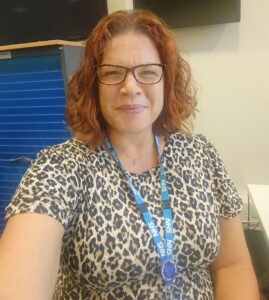Emma Reader staff profile
For AHP day on 14 October Emma Reader from the east of England UEC (Urgent and Emergency Care) team shares her carer journey in the NHS.
Where did your NHS career start?
I first started as a volunteer at Addenbrookes hospital (part of Cambridge University Hospitals) running activity groups – art, music and exercise – on the older persons wards to help prevent deconditioning during hospital stays. I then worked as ward assistant before becoming a healthcare assistant on a medical observation unit.
Becoming an allied health professional (AHP)
I wanted to be an occupational therapist (OT) due to the diversity of patients you work with. An OT looks at factors that influence an individual’s ability to carry out all aspects of daily life from personal care to domestic tasks, to social interactions.
I studied for a BSc in Occupational Therapy at the University of East Anglia finishing in 2005. I took a band 5 role in Norfolk completing training rotations across physical and mental health.
I moved to Surrey for five years working as a specialist in mental health before moving back to the region taking on a role in Crisis Resolution Home Treatment (CRHT). My role was to look at people’s daily routines and provide support to re-introduce elements like sleep hygiene (good sleep habits) and timetabling activities to support motivation, as well as medication support.
Changing focus
I started my leadership journey in 2015 as a team leader in Home Treatment, then moved into strategic space two years later as wanted to influence patient pathways
My next role was to provide a clinical perspective reviewing the roll out of Electronic Patient Record, supporting changes being made to the system and ensuring that a clinical lens was always used. I then had various operational and programme management roles before moving to Regional UEC Operations.
Motivation and reflections
What drives me is better patient outcomes and better patient experience. Unplanned care is the scariest pathway to be in and when it really needs to go right.
Being an OT has given me a unique skill set around problem solving, a logical approach to programme management, a focus on outcomes.
When I trained an academic degree was the only way to become an OT which was hard however there are so many pathways out there now.
My key piece of advice to anyone considering a career as on OT is getting the early hands-on experience in the NHS, it really supported my understanding of how the health and social care system works.
Next steps
I have a renewed enthusiasm for my career since starting my current role and want to progress within the Urgent and Emergency care space. Just started my Elizabeth Garr

Find out more about AHP careers and the health careers website.
